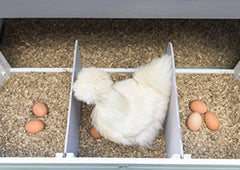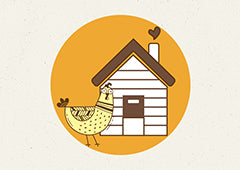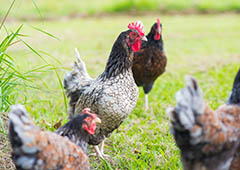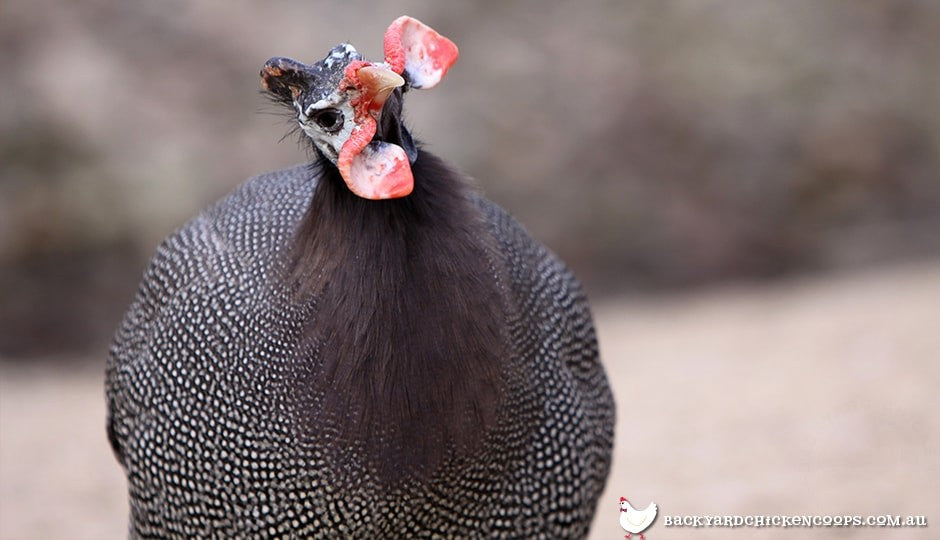
Guinea fowl are not like chickens. Though there are similarities in their appearance, though they both lay eggs and even though many people raise Guinea fowl with chickens, let me restate (so I know you understand), that Guinea fowl are very different from chickens. Guinea fowl truly are one of the quirkiest birds around. They have a unique sense of style. They aren’t afraid to make a bit of noise. They are quintessentially homebodies. They are paradoxically both protectors and bullies. They have all the nuance and contradiction of a well-drawn character like Walter White, Blanche DuBois or Hamlet. With this is mind, it’s essential that you understand what you are getting yourself in for if you decide to get a couple of Guineas for you garden. Some people fall absolutely head over heels in love with these funky little creatures but it's important that you understand their peculiarities before you let them loose in your garden.
Guinea fowl are first rate insect killers
Many people find themselves contemplating getting some Guinea fowl when they discover what supreme insect hunters they are. Anecdotally, people have proclaimed that their Guineas have swiftly eradicated grasshoppers, ticks, fruit flies and other kinds of bugs, beetles and insects from their garden in a matter of days. This is because these creatures tend to feed in one spot until there is nothing left for them to eat. Though Guinea fowl don’t really resemble a Bond style sexy Russian spy incognito, let me assure you that these birds are expert insect killers, with honed senses and superior cunning.
The fearsome song of the Guinea fowl
Not only do Guinea fowl systematically devour the insects in your garden, their peculiar cries and calls will often deter other animals from your garden, allowing your laying hens, like ISA Browns and Plymouths Rocks to lay in peace. Some breeders have playfully referred to Guinea fowl as “nature’s alarm system”. You will instantly recognise a change in your Guinea fowl cries when they encounter something that is threatening or unfamiliar to them. If you have a problem with mice, rats or snakes, the presence of a Guinea fowl and their fearful call will have them heading for the hills in droves. There have been reports of Guineas killing and eating larger predators, like rats and even snakes- but this is not the norm. It is the fearsome song of the Guinea fowl that announces to other predators that your yard is off limits.
Also, the easiest way to determine the sex of your Guinea fowl is by the listening to the sound of their call. Male and females make distinctly different noises, which you can listen to by simply following this link.
What do I feed these creatures?
Guinea fowl are expert foragers, so they will be able to get much of their food from picking up bugs and other little treats in your garden. This being said, it doesn’t hurt to give them some extra feed to ensure that they are getting enough food. Do ensure that you don’t give them any shell grit as it will make their eggs unnecessarily hard and crunchy - especially if you are planning on breeding Guinea fowl, as the chicks won’t be able to peck their way out of the shell.
Egg Matters
Guinea fowl will only lay eggs when the condition are just right. They prefer warm and dry conditions, which means in the Australian climate they are likely to lay for longer periods of time. Though Guinea fowl eggs are a good substitute for chicken eggs, they unfortunately only produce less than 100 eggs per year. But, what they lack in eggs they make up for pest control.
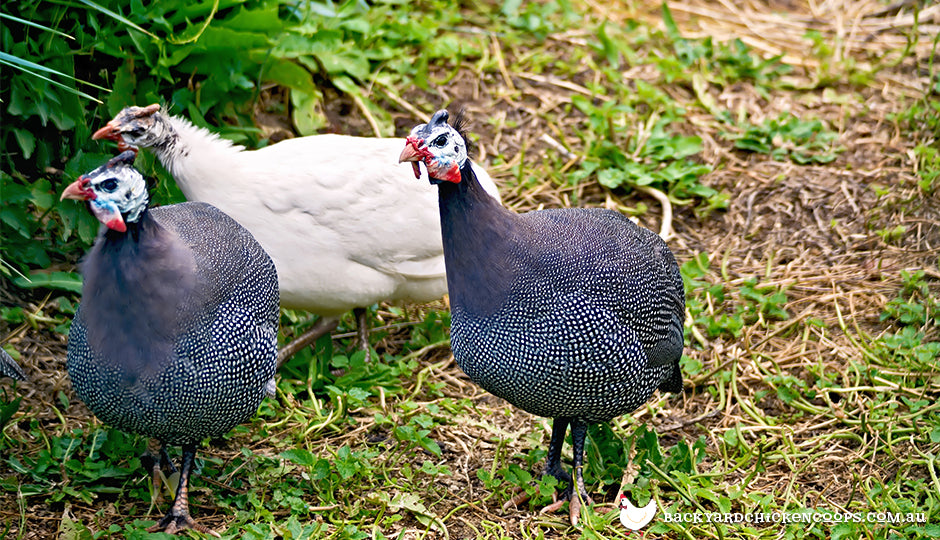
“There’s no place like home” for your Guinea fowl
Guinea fowl are next level homebodies. Like elephants, Guinea fowl seem to have a remarkable inbuilt radar, which they are able to use to lead them back to the place they were born and raised. This is of some comfort because you can let your Guineas wander without too much worry of them getting lost. However, the real problem is if you adopt adult Guineas that were not born and raised on your property. If you adopt adult Guinea fowl, is it essential that you keep them confined to a coop, like the Penthouse, or some other kind of enclosure, for several weeks to a month, otherwise they will attempt to return to their homeland.
Coop confusion
Guinea fowl tend to be wilful and determined and may initially reject the coop or hutch, as it does not resemble their initial home environment. They can however be trained if you are consistent and persistent. Simply move the Guinea fowl into the hutch at the end of the day, every day, without fail for several weeks and they will soon learn that this is their new home. Additionally, having a place for your Guineas to roost is vital to ensure that they are calm and relaxed. This being said, it may take them some time to realise they can roost inside their hutch, but so long as you keep them shut in during the evenings, they will eventually work it out.
A lot Guinea fowl lovers prefer to get them when they are baby keets, as they find it easier to accept their surrounding when they are young.
Your Guineas like to hide their nests
If you can trust your Guinea fowl to wander and explore your yard, it is likely they are going to build secret nests to hide their eggs. This is entirely natural for Guineas to do. Normally they will build their slightly unsophisticated nests in tall grass or under shrubs and trees. This can be frustrating for some owners who want to either breed Guinea fowl or eat their eggs. However if you’re keeping Guinea fowl to breed or simply for the company, then their nest building habit will be an endearing little quirk that they have.

Guinea's prefer to come in twos
Guinea fowl are pack creatures by nature and it is essential that you keep at least two if you decide to get some. If Guineas feel isolated and alone it is likely they will act-out or try to run away. Make sure your cute little Guinea fowl has the company otherwise you may not hang around for very long.
Check with the local council
Some City Council's have banned Guinea fowl from more suburban areas largely because of the noise they make and their tendency to roam. A quick phone to the council or asking at your local breeder is the best way to ensure you can keep Guineas in your area. Also, if you have neighbours living close by it might be a good idea to just let them know about these lovable creatures, just so they can get used to the idea of listening to the happy little Guinea song, as well as having them wander over to say "hello" every now and then.
People love their Guinea fowl
Recently we did a call out on facebook to ask people what they thought about Guinea fowl and the response was overwhelmingly positive. Here is what some people said:
- "... I think they are fantastic and there should be more of them"
- "... Best birds anyone can have"
- "Best birds ever- keep the ticks away"
- "We have about 10 here. They are great alarms at letting you know if someone is around and great snake killers"
- "Best birds we ever had. We love them"
Guinea fowl are truly one of the most peculiar, quirky and original poultry birds around. They are unique creatures that need to be cared for in particular ways but the rewards for keeping Guinea fowl are priceless. They will protect your garden from an onslaught of bugs, sing unusual but nonetheless sweet songs and, well, they’re just simply delightful to watch.
Having a strong and reliable coop, such as the Taj Mahal, Penthouse or Mansion, is the perfect way to ensure that your Guinea fowl stay safe and comfortable as they adjust to their new home.



